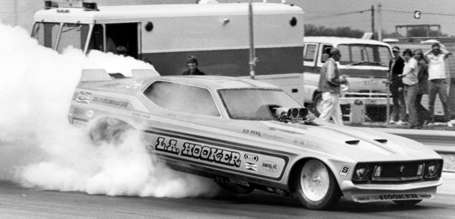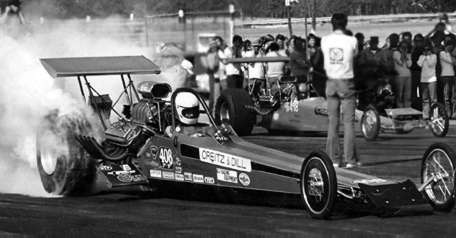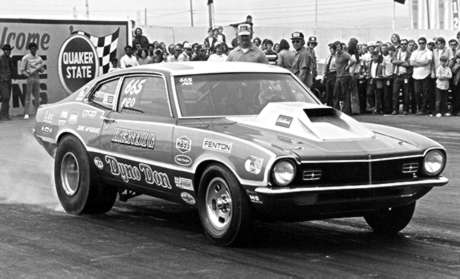 |
 |
|
The L.A. Hooker at Tulsa International Raceway.
Photo by Steve Reyes.
|
AHRA’s Grand American tour continued along the high road under
Tice’s leadership, always within shooting distance with NHRA during
the early half of the 1970’s. In 1971, AHRA signed up always-busy
Fremont Raceway in northern California, the new St. Louis International
Raceway, and a year later the new Century 21 Speedway in Denver, Colorado.
A year later, AHRA wound up sanctioning events at the best weekly track
on the West Coast, Orange County Int’l Raceway in 1973, and in
1974, nailed down Orville Moe’s brand new Spokane Raceway Park,
the track that first hosted the AHRA Springnationals in 1974 and 1975
and then becoming the site of the association’s World Finals in
1976.
The midwestern octopus expanded in other ways as well. In 1972, they
got a push from Don Garlits that changed the face of the sport, monetarily.
It was Garlits’ contention that NHRA’s purses were insulting
to the pro drag racers and that they had the wherewithal to pay a lot
more than they had been paying. In the 1950’s and early 1960’s,
both hot rod associations paid their winners with items like new cars,
tool collections, and savings bonds, with checks only surfacing every
great once in awhile. By the late 1960’s, money did rear its horny
head, but not enough according to Garlits. He felt a sense of allegiance
to AHRA because they had played a progressive role in regards to establishing
a Top Fuel class and had come up with a Grand American system that he
felt, given the times, was fair in its treatment of the pro racers.
“Most fans remember the ‘Great Burndown’ between me
and Steve Carbone at Indy in 1971,” Garlits recalled. “But
do you know how much Carbone made when he won, and we’re talking
here about one of the most famous Top Fuel finals in history. He got
$3,000; that was it. I thought that was terrible and I just knew that
NHRA, which was the bigger of the two associations, could afford to
pay a lot better than that. So, I came up with the idea of the Professional
Racers Association and the PRA Challenge, which I was determined to
run opposite NHRA’s Nationals in 1972. I approached Jim Tice and
he thought we could pull it off.”
Garlits and AHRA got together and hosted the AHRA PRA National Challenge
at Tulsa International Raceway on Labor Day Weekend with $35,000 going
to the winners of Top Fuel, Funny Car, and Pro Stock. Overwhelmingly,
their objective was achieved. Like the 1970 AHRA Grand American at Lions,
the PRA race took all the top cars away from the big to-do at Indy that
year.
Filling the Top Fuel lanes at Tulsa that year were the cars of Garlits,
Carbone, Chris Karamesines, Pat Dakin, Creitz-Dill-Vic Brown, Dennis
Baca, the winner Don Moody in the Walton-Cerny-Moody dragster, Dick
LaHaie, Don Cook, 1972 NHRA Top Fuel world champ Jim Walther, Cyr &
Schofield, Gary Cochran, Keeling & Clayton, West Coaster James Warren,
and on and on the list went.
 |
| Vic Brown in the Creitz & Dill dragster |
Funny Car had Don Prudhomme, winner Tom McEwen, the Ramchargers, Gene
Snow’s two Revell “Snowman” cars, Don Schumacher’s
two “Stardust” Barracudas, the “Blue Max,” Bill
Leavitt’s “Quickie Too,” Roland Leong’s “Hawaiian,”
Mr. Norm’s Charger, Mike Burkhart’s two cars (one with Raymond
Beadle driving), the Whipple & Mr. Ed Satellite driven by Dave Beebe,
Mickey Thompson’s Pinto with Dale Pulde driving, the “Chi-Town
Hustler” with Ron Colson up and most of the big names in the class.
Pro Stock? Winner Bill Jenkins, Butch Leal, Don Carlton in the “Motown
Missile,” a young Warren Johnson, Herb McCandless, Don Grotheer,
Mike Fons’ Rod Shop Dodge and others of the same ilk.
 |
|
Dyno Don Nicholson's Pro Stock Maverick.
Photo by Jere Alhadeff.
|
Obviously, this was the cream of the pro racing crop and they united
to various degrees that the purses should be higher and to hell with
Indy. Prudhomme and McEwen did straddle the fence by flying up to Indy
from Tulsa to race their Top Fuel dragsters, but overall, the Garlits
/ AHRA show made the 1972 U.S. Nationals the weakest in event history.
 |
page 4 of 6 |
 |
|